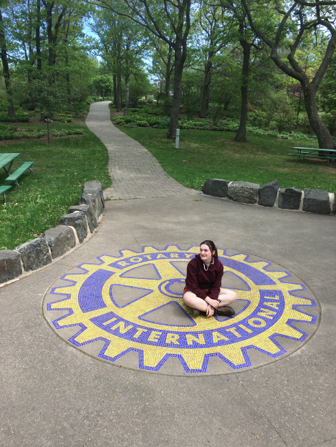Here are some questions we frequently get asked. If you’ve got a question that’s not answered here, get in touch with us at rotaryYEP9640@gmail.com or via our contact form.
What is Rotary?
Rotary is a global network of 1.2 million neighbours, friends, leaders, and problem-solvers who see a world where people unite and take action to create lasting change – across the globe, in our communities, and in ourselves.
Solving real problems takes real commitment and vision. For more than 110 years, Rotary’s people of action have used their passion, energy, and intelligence to take action on sustainable projects. From literacy and peace to water and health, we are always working to better our world, and we stay committed to the end.
Find out more about Rotary here.
Am I eligible to be a Rotary exchange student?
The Rotary Youth Exchange program is generally open to high school students who are aged between 15 and 18.5 on the day of their departure. Students are able to either go on exchange during their high school years (NSW and Queensland), or in the year directly following their graduation (Queensland Only).
Exchange student candidates must be interested in the world around them, a self-starter, self-confident, friendly, adaptable, and adventurous, willing to potentially learn a foreign language, with above average grades in school.
Find out more about who can apply here.
What is the long term program?
The long term program is our hallmark exchange program. Students participating in this exchange spend 12 months overseas.
It is mandatory for participants to attend high school, and they may or may not get credit back home for courses taken (Please refer to our Who Can Apply page for more information on this). Each student will likely have more than one and usually up to three or four host families through the year, to broaden the experience and see the variations that exist in all cultures.
It takes a very special teen to consider themselves capable of spending a year abroad, but the rewards and experiences are unlike anything you may ever know again. If you think you can do this, don’t let the opportunity pass you by.
Click here for more information on the long term program.
Do I get to choose my country?
This is a very popular question! And the answer is… yes and no. The countries we exchange with are those we know run top-quality programs and are Rotary International Certified, and we re-evaluate them each year. There are a limited number of exchanges available with each country, and we will not overload any country in either direction, inbound or outbound.
When allocating countries we take into account the hosting countries specific requirements as well as your preferences.
For long-term exchanges we ask you to select five preferred countries, and we allow you to refuse any countries that you would not accept as a host country. The majority of students will get one of their five choices. But remember, flexibility is a vital characteristic for a successful exchange student, and that starts right at the beginning.
If you have your heart set on exchanging with one particular country, and that country only, we recommend you look into a commercial youth exchange provider.
Short-term students, however, apply for exchange in our particular country. This is because we only do short-term exchanges with a very small number of countries.
For more information about our exchange destinations click here.
Do I have to know another language?
For the long-term program – no, you do not need to be fluent before you go. Naturally, it would help to have some familiarity with the language of the country you go to, but we don’t limit the program to those who are already bilingual. In fact, one of the great benefits of the program is quickly gaining fluency in another language.
However some countries do have minimum language requirements for students to achieve befor ethey depart and while they are away (for example France, Switzerland and Czech Republic), and we also have minimum language requirements for those countries where we know language skills are critical (ie Italy and Japan). We strongly recommend that all participants start learning their host country’s language as soon as they are selected for the program. The more of the language you know up front, the better your experience will be and the less homesick you will get.
If you are applying for a short-term program (if we are running them), however, it will be considered very favorably if you are already able to demonstrate some language proficiency for your destination country. This is because students are only on exchange for a short time and don’t have time to gain fluency.
Will I get school credit for my exchange year?
This varies from school to school and country to country. You should sit down with your school when you apply and when you know what country you are going to for your exchange. Pre-planning makes a big difference.
We do not allow students to complete a school year in Australia via remote/distance learning at the same time as being on exchange as this will significantly impact your ability to actively participate in the exchange experience and get the most out of it.
Most students who elect to go on exchange during their high school years will take the year as a ‘gap year’ and resume their schooling when they return to Australia. Some students who are in Year 9 when they apply may be eligible to enter Year 11 when they return. We have also recently had students go at the end of Year 10 and come back and enter Year 11 by completing ATAR credits during Year 10 by completing TAFE Certificate Courses. Please speak to your school about your own personal situation.
Please refer to our Who Can Apply page for more details.
What if I have problems during my exchange?
The design of the Rotary Exchange program is such that if you have problems we have the resources to help you solve them starting with your connection to a Rotary Club and it’s members right in the community in which you are living. You will have multiple avenues of help available to you to resolve any problem that might come up.
Rotary International and Rotarians in general take very seriously our responsibility for the safety and security of all Rotary exchange students, both inbound and outbound. In November, 2002, the Board of Directors of Rotary International adopted the following Statement of Conduct for Working with Youth:
Rotary International is committed to creating and maintaining the safest possible environment for all participants in Rotary activities. It is the duty of all Rotarians, Rotarians’ spouses, partners, and other volunteers to safeguard to the best of their ability the welfare of and to prevent the physical, sexual, or emotional abuse of children and young people with whom they come into contact.
Do my parents have to host an inbound student?
Naturally we hope that the parents of outbound students are happy and willing to reciprocate the generosity being offered to their own child by other families by hosting inbound students themselves. This is an amazing opportunity for the entire family to experience a cultural exchange themselves! However we know that sometimes circumstances mean it is not possible for families to host an inbound student in their own home, so hosting yourselves is not compulsory. However, if you are successful in your application you will be required to either host or assist us to find host families for the inbound student we will need to host in exchange for you.
You can read more about this on our Information for Parents page here.
Can you host if you are separated or divorced?
Yes! the hosted student simply moves between the parents as the other children in the home do.
What if we only want to host an inbound student?
Rotary Clubs are always looking for potential host families. If you’d like to enrich your family’s experience by bringing in a Rotary exchange student, please complete our host family expression of interest form. And thanks so much for your interest!
Can I travel? And can my family visit me?
While this is not a tourist program, you will have the opportunity to travel and explore your host country (and potentially surrounding countries) on your exchange – through tours with other exchange students organised by the host Rotary district, and trips with the host families and other members of Rotary club. Rotary group tours are at the student’s own expense. Solo travel to visit family or friends who live in your host country is often not allowed and requires specific district permission.
We do not encourage families to visit students while they are on exchange as it can be highly disruptive and can set back progress the student is making on their personal growth. Student’s on exchange are becoming more independent, resilient, and learning to make their own decisions and stand on their own two feet. A visit from their parents can derail this.
If parents do want to visit, it must not be before the nine month mark of the students exchange, and should be for a short visit only. Students are not permitted to temporarily leave the program to travel with their family, and they cannot meet their family at the end of their exchange to travel – they must return home on the flight booked for them as part of their study visa requirements. Any visit must be approved by the host Rotary club and the RYE Chair of the district, as per the rules and permissions form signed by all students as part of their exchange application.
We know as parents you are keen to experience your child’s life, but we recommend the best way of doing this is returning with them after their exchange is completed when they can be your tour guide with no restrictions.
What’s the story with the blazers?
Blazers are emblematic of Rotary’s youth exchange program. Each participant gets a blazer in a colour based on their home country. Students often cover the blazer with pins and other items they trade with one another and collect during their exchange.

OK, bottom line, what does it cost?
The Rotary Youth Exchange Program is considered to be the most cost effective exchange available – on average a Rotary Exchange is less than half the price of many other commercial providers. Where there are providers with similar costs, we encourage you to cross-check the level of support that is provided. For example, our long-term exchange includes 2 x two night orientation camps before the student departs, all orientation camps in the host country when the student arrives, and a two-night orientation camp on their return!
Why are our exchanges cheaper than most other exchanges? Because Rotarians are all volunteers, so there are no salaries or commissions paid to the hard-working, passionate people who administer this program, and there are no payments made to host families.
It does cost money, though, to market the program, make the arrangements, present the orientations, provide student materials and supplies. And, of course, there’s airfares, insurance, and other travel expenses.
Rotary exchange students spending a year abroad are also provided with a monthly allowance from their host Rotary club, usually around AUD$100-$150 per month (a total of $1,200 – $1,800 per year). If you want or need spending money beyond that, it is up to you and your parents to provide it.
Keep in mind that whilst you are living at home in Australia, it does cost money. Think of this cost being offset by you living in a host country.
More information about the cost of the program is available here.
How do I apply?
If you still have questions about the long or short term programs, first send us an expression of interest form and we’ll get back to you, or email us on yep@rotary9640.org
If you’re ready to apply for a long term exchange, you can complete a preliminary application form here.





